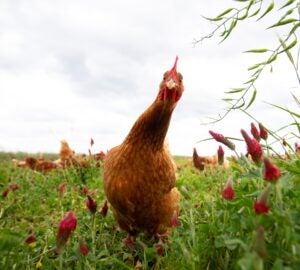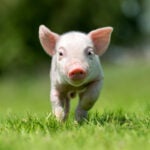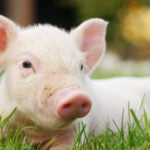
BRUSSELS—Humane Society International/Europe welcomes the European Commission’s decision to bring forward its legislative proposals to revise EU animal welfare rules from the fourth to the third quarter of 2023. This decision—outlined in the Commission’s work programme for 2023 presented earlier this week—reaffirms the Commission’s commitment to advancing farm animal welfare. With the European elections and the appointment of a new Commission leadership due in 2024, it is vital for these legislative proposals to be delivered as soon as possible.
Dr Joanna Swabe, senior director of public affairs for Humane Society International/Europe, said: “We are delighted that the European Commission is on track to deliver its impact assessment and legislative proposal for the revision of the EU animal welfare legislation in 2023. A large portion of Europe’s farm animals have suffered long enough living under cramped cage confinement conditions that fail to meet their complex welfare needs. Moreover, for many other farmed species, such as cattle, sheep, goats and rabbits, there are still no species-specific minimum standards to ensure that their welfare is adequately protected. Any delay in delivering the much-needed legislative proposals would be wholly unacceptable and a slap in the face of a growing number of EU citizens who want to see farm animal welfare radically improve.”
It is noteworthy that the Commission’s work programme explicitly mentions the European Citizens’ Initiative to End the Cage Age, which was supported by 1.4 million European citizens and more than 170 organisations across the EU. In addition to proposing legislation to end the caged confinement of farm animals, it is expected that the Commission will strengthen and introduce minimum welfare standards for all species farmed for food, as well as updating the rules for live animal transports and slaughter. Amongst other things, it is expected that the Commission will seek to end the mass killing of “surplus” day-old male chicks.
Further to the revision of the EU animal welfare acquis, the Commission is also expected to deliver a legislative proposal on Sustainable Food Systems in the third quarter of 2023. This is also warmly welcomed by HSI, as Swabe notes:
“Our current food system is largely unsustainable and is inextricably linked to climate change, biodiversity decline, environmental pollution and public health crises. There is mounting and incontrovertible evidence that the EU cannot continue with ‘business as usual,’ particularly with regard to the (over)production and consumption of animal products. It is a good move to try to mainstream food policies and achieve policy coherence at both an EU and national level, but it is vital that this legislation includes measures to stimulate the adoption of higher animal welfare standards, reduce farm animal numbers and stocking densities and to increase the production and consumption of plant-based products.”
Once presented, the Commission’s legislative proposals must also be approved by Member States and the European Parliament. HSI, however, notes that, given the time needed to complete the ordinary legislative procedure and the number of legislative files needing to be finalised by the Parliament before the 2024 EU elections, there is a strong likelihood that both of the Commission’s proposals will be dealt with by the next legislature.
HSI also warns that there is likely to be strong industry opposition to implementing stricter animal welfare standards and attempts to water down the Commission’s proposals, largely on the basis of costs. However, HSI reminds both Member States and industry that rather than resisting this necessary change to improve animal welfare, they should be making full use of the funding opportunities provided by both pillars of the Common Agricultural Policy . For example, eco-schemes (a new feature of the 2023-2027 CAP) should be used to finance the transition to cage-free animal production, or even more sustainable non-animal agricultural production activities.
ENDS
Media contact: Yavor Gechev, Humane Society International/Europe: ygechev@hsi.org; +359889468098



